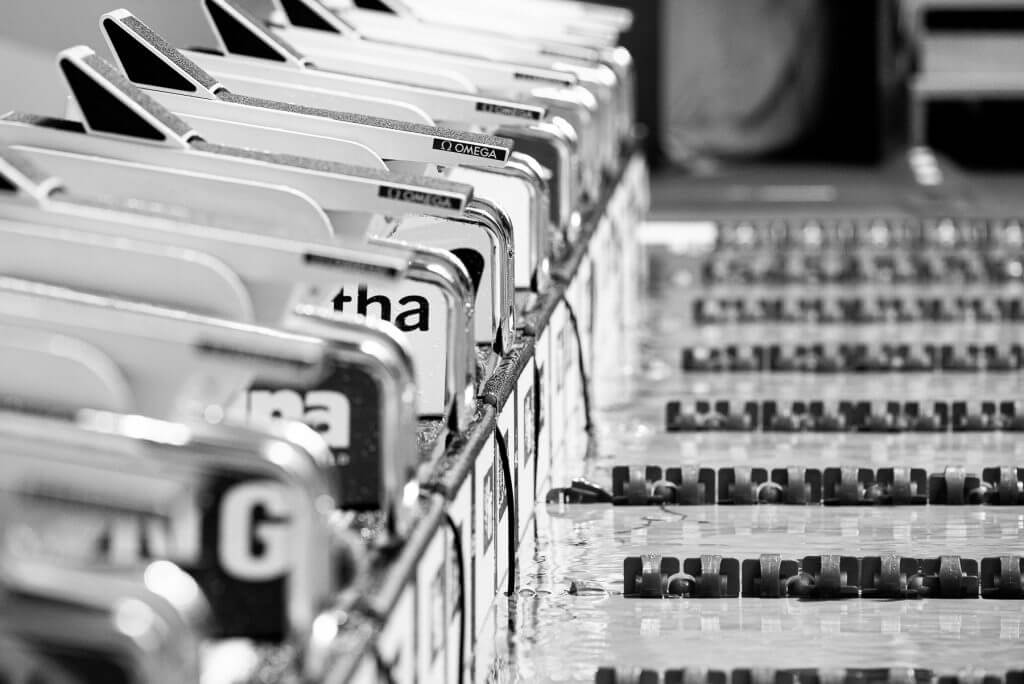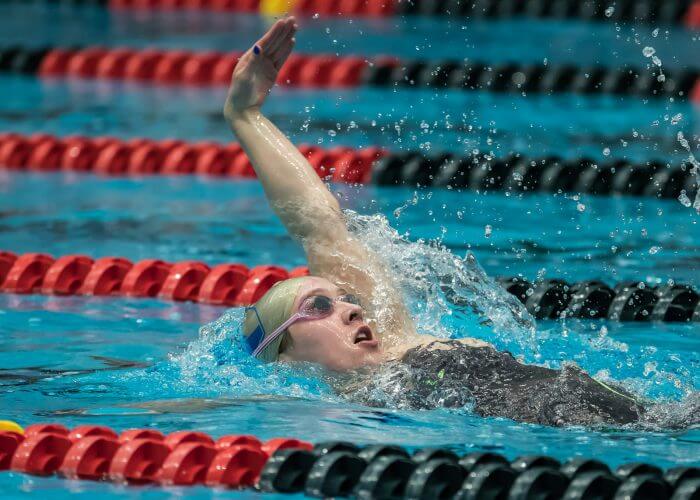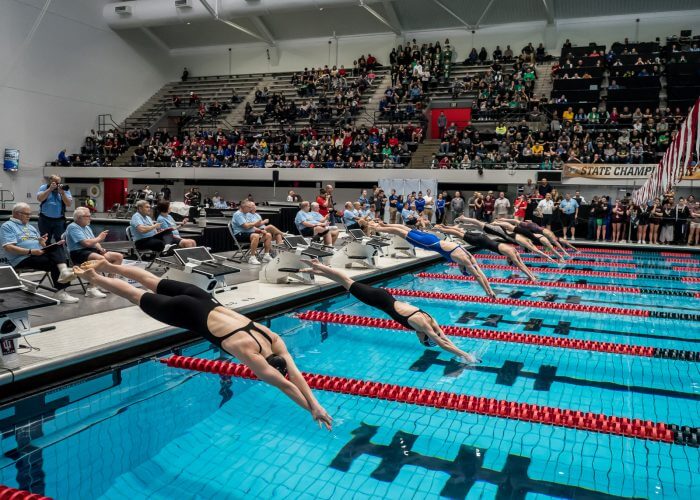7 Familiar Reasons Why Swimmers Leave the Sport; How to Combat Them

Swimmers are renowned for their dedication to their sport. We train long hours at ridiculous times and spend all day at meets only to spend a few minutes actually racing in the pool. However, all swimmers reach a point in their careers when they question why they’re still doing it. Although many relocate their love for the water, there are several factors which can stop a swimmer returning to the sport, especially in the early years.
Here are seven reasons young swimmers stop swimming and how we can combat them to make the sport we love even more popular:
1. Pushy Parents
We all know a pushy swim parent. They’re opinionated and loud, leaving you feeling sorry for their child. However, as much as this type of parent makes you cringe, their child is the one who has to deal with their behavior outside the pool environment. This dominating behavior can lead to swimmers hating a sport that they should enjoy simply because they are never allowed a break from it. A simple way of getting a swimmer through this is to talk to their parent. Once they realize the effects of their tactics, they’ll likely monitor themselves more closely.
2. Injury

Photo Courtesy: Dr. G John Mullen
Injury is every swimmer’s worst nightmare, but with the massive amount of strain we put on our bodies, injury is common in the swimming community and can be a main reason why many people exit the sport. Injuries are – to a certain extent – preventable through pre-practice exercises, a good warmup and smart training. And most often, the occurrence of an injury does not need to end a swimmer’s career. Physiotherapists are keen to help any sportsperson get back into their favorite modality.
3. Coaches
Coaches often dictate the feelings the swimmer has toward the sport. If a coach is overly controlling, a bully and makes a habit of having favorites, he or she will likely discourage swimmers from wanting to swim. But coaches of integrity treat their athletes well and help instill life lessons through the sport of swimming. Those coaches do more than keep swimmers in the sport, they help swimmers become better people through the sport.
4. The Lack of Social Life

Photo Courtesy: Bonnie Brandon
Young people love spending time with their friends, and while many swimmers find our friends in the pool, some want to spend time with their friends outside of it. This can lead to swimmers missing training to spend time with groups of people who aren’t swimmers and eventually may lead them to quit swimming (as they become jealous of those with more relaxed free time). This, however, doesn’t have to be the case. Swimmers can learn to balance their time well so they can enjoy other things in their free time. Committed swimmers often find the biggest draw to the sport is the social circle it comes with.
5. Boring Sets

Photo Courtesy: Peter H. Bick
Every swimmer has a set they hate. These sets are normally monotonous and dull and make you wonder why you bothered to get in the water. Now imagine doing one of these sets every day. Slowly, the hate for the set changes into a hatred for the sport itself. By making sets fun or mixing them up, a coach will not only improve their team but keep athletes interested and engaged in the sport.
6. School
Education is important. Sometimes the dedication that is needed for swimming can have a negative impact on how a swimmer performs at school. Ultimately, some swimmers quit the sport to improve their grades. A club can combat this by encouraging swimmers to balance their education and sport. A good coach understands school is a priority and they will understand when a practice needs to be missed here and there.
7. Lack of Improvement

Photo Courtesy: Peter H. Bick
As a swimmer you can’t help but compare yourself to your teammates. You do the same sets, swim the same mileage and race at the same meets as each other, so to watch someone who does the same training as you achieve more is hard for anybody to swallow – especially the young swimmer. By teaching a young swimmer to only compare themselves to themselves and focus on pushing oneself to their own greatest potential, a swimmer will learn that swimming is about individual performance and what can be learned in the refining process.
All commentaries are the opinion of the author and do not necessarily reflect the views of Swimming World Magazine nor its staff.




Melissa Malkan Healy… another good one.
Jerry Teresa Bullard
Terrible picture
Now for the seven reasons they come back after one of the seven reasons they left!
DO they come back?
Well, I’m trying too. And I’m 28. I quit 10 years ago. Basically starting over again but not only have I realised how much I missed it, it’s helping my mental health.
The only reason anyone would ever come back is because they don’t know what to do because they have only done 1 thing there whole lives and their identity has been swimmer only.
Coaches… yep
Good article for my teen daughter. Lately she is in that mood because she doesn’t have enough free time. I will share this article with her.
Or your eligibility is up haha
#8: they are forced to because so many colleges are cutting swimming from their athletic programs
Stacey Preston preach
#9: they are fed up with swimming against drug cheats.
#3: if a coach is a bully or has a tendency of picking favorites.
My daughter is an 11 year old swimmer and wants so desperately to please her coach. This is a long struggle for many athletes.
so very true so many coaches are demanding and bullying instead of guiding and pushing without the swimmer knowing
#10 – Because Swim meets take 3-4 days?! Looking forward to Swimmingly helping to change that for our team!
No pools available for swimming ?
I miss the pool
I hope you have an article about why they stay.
Why is there a picture of Sydney sticking her tongue out? She hasn’t left the sport. I’m expecting her to be in the Olympics next year.
Though she had an incredibly successful 5 year ‘career’ in swimming, our daughter quit to play ice hockey because she found ice hockey way more exciting, action-packed and filled with team spirit.
Sounds like she needed to find water polo?
For college athletes, their focus changes to their professional life after swimming.
Wafa’ Abbassi
Long commutes to good programs!!
Age is a big factor as well. I started swimming at 15,years behind my peers. I wasn’t recruited to college because I wasn’t fast enough. I cried a lot. I just hope. It gets better with time.
New reason: schools cutting programs
Another negative report
Not to mention “the payoff”. Aside from maybe a college scholarship, there’s no NFL for swimming. Unless you’re Michael Phelps or Dara Torres with sponsors, you can’t make a career out of it. You realize at some point that even with the dedication to achieve such heights, you just aren’t going to get there….and your time is better spent on a career that will better keep your lights on and gas in your car.
This!
There is ISL
John, I had this exact conversation with my daughter and a HS Senior. However, when she landed a job with Speedo, I reminded her that sometimes I just don’t know what I’m talking about.
That is the point!!!
Former D1 here. Biggest payout is the help it gives to get you into graduate programs and job interviews. Most employers like college athletes because they are competitive, know how to manage time and are able to handle uncomfortable situations. Watched many a college athlete move to top of recruiting lists because of their sport.
Confirmed fact….THE CHILL….getting in to cold water…yes…we all know the body will adjust once in the water….But….we never…ever look forward to th….CHILL…ever…
definitivly , never got used to it even after 55 years of swimming
An 8th reason is if a BIG TEN University dismantles and ends their men’s & women’s swim program mid-season without warning. Imagine trying to get up and down a lane after that news???
Imagine if you are a high school swimmer who was so excited because he was just offered a swim scholarship to a Big Ten university, only to get the news a week or two later. I assume we are discussing the same place. I feel for the young people who were there. Such a sham.
9 covid
Lockdowns
Vladimir Latocha Praticien Feldenkrais
I never swam as a kid. Now as an adult I swim every day without the mental damage I would have probably gotten from age group clubs, jerk coaches, and swim meet stress.
Today, I can’t imagine missing the joy and tranquility of the water. The answer to not ever leaving swimming?….don’t start the sport until you are in your mid 20’s.
I swam from 6 to mid 20s. Then left for years. My two daughters have been swimming for the last 4 years. I swim in the public lanes whilst they train 3-4 times a week and I think it is my favorite part of the week. I know I will never ever stop.
Daniel this is a very good article.
Thk you for the article. Number 4 and 7 are…interesting!
Christa Swart dit is baie interessant, kyk bietjie no 3.
If fortunate…they simply graduate to water polo. Speed, athletic ability, and the big one…social team work.
8, burned out!!
9) no pools open since march to train with team
Jessica Middleton Newman , true. Plus it’s amazing how funds are directed towards initiatives that don’t work.
Cost. This can be a big factor.
Kathryn Newberry most expensive sport when you count in travel costs. Btwn dues, personal trainers, camps, fees, tutors ect ect 20k a year min for a senior swimmer
I know! It’s crazy! And with the schedule, my son can’t get a part time job.
Left the water for over 20 years. Came back and realized that the water was my Zen. It’s different as an adult.
Chlorine induced asthma. Never knew the risks until daughter was diagnosed. Right after the diagnosis, I started to discuss it with other parents. Found out that well over a third of the team also was diagnosed with the same thing. A real hidden secret is the dangers of close and consistent exposure to chlorinated water. So, there can be severe health risks with swimming. A lot of health benefits with the sport. Just do your homework regarding how your club mitigates this situation.
So sorry this happened to your daughter; hope that she is doing much better. Our son was diagnosed with asthma when he was only 2 but I am happy to say that his asthma totally improved when he started swimming. In fact, he did not need medication after he was about 12. He quit swimming after his senior year of high school because he wanted to concentrate on school
Weekend meets that are way too long. How can that not be on the list? Most other sports (except maybe gymnastics) competitions are over in 2-3 hours. And for the younger kids we need to be more of a team sport by focusing on relays or scoring for age group teams. If swimming doesn’t change their old school mentality for competitions then we will always lose out to other sports.
I agree…the small, short meets that don’t require overnights in a hotel are what keep them in …save the larger, longer meets for the older/more competitive swimmers. Split session meets have really helped over the years, however with many it still spans at least two days, and families tend to just pick one day, missing out on other events.
Lol. Swimmers need the rest. Ours our friday nights till sunday nights. Is what it is. Would rather have them rest than be murdered due to lack of rest. Swimmers also swim several events. In college most meets are o ly a couple hours but they only swim 1 or 2 events.
Rob Richardson : Some meets are too long. You’re basically describing only club invitational & championship meets. Plenty of other formats teams can implement.
Rob Richardson well old school it was 3 full days with no USA swim time limits I recall 3 meals at the pool. Friday night being at 11pm and back in the pool by 6:30. 70’s- 80’s were nuts.
Rob Richardson the emphasis has long been put on weekend-long championship-type formatted meets. We need to value smaller, day-long, shorter, uniquely formatted competitions. It starts with how we communicate to our parents. We started this. We need to fix it. We also need to emphasize competitions our teams can make some money on- including unsanctioned, fun meets- entry fee and no splash fees. Times achieved during these unsanctioned meets could count toward LSC championships. This makes competition more accessible to everyone- teams and swimmers. Right now- we inadvertently provide for those who can afford it. And many teams and swimmers are marginalized.
Julie E Bachman here in Texas HS season is way to long and that burns out the 15 over. If they swim HS meet every other weekend from sept- jan than go through districts and regional in jan. With states concluding in feb. When will club be able to get those kids on a schedule?
My other 2 cents bring back sprint meets and relay carnivals.
Julie E Bachman totally agree! Trying to change this in AZ!
Rob Richardson here, here. I can’t believe the days, weekends and hours we wasted. Could have been spent on a million other more productive things and family time. Basketball over in 1 hour even at rep level.
And the list goes on…
-Lazy and inexperienced coaches who confuse swimmers.
-Coaches who believe in bring negative all the time.
-Coaches who tell intelligent swimmers foolishness.
-Not enough opportunities fir them swimmers to attend big meets.
-A bag of excuses from those who are in authority to make decisions regarding opportunities for swimmers.
All I remember is, training being horrible. You NEVER go a personal best, and you basically train in isolation….. even with a full team around you. Head is under water… I even remember the dreadful song stuck in my head, that would start over after every breath. No other sport like this. Track etc….
Number 2 for me. I really miss it. ?
Toni Colette
Nicole Jones
3, 4, 7.
True
Cause no matter how good you are it’s boring, and gets you nowhere unless you r that 1 in a billion. No team its an individual sport no matter what bs they spin.
#2. I had to stop swimming. It breaks my heart to this day that i never reached my goal. The water is and always has been my happy place.
8. Addicted to computer games.
1. Expensive
2. Lots of time required
3. Injuries
4. Future of the sport
5. College dropping program
6. Controlling coaches
7. .. .. on .. on
I was secretly overjoyed my son didn’t follow in my swimming footsteps. Don’t think I could do the full weekend swim meets again, I probably would have gone crazy.
Track & field, cross country were surprisingly quick in comparison.
I wonder how this opinion piece compares to Dr, Susie Tuffy’s scientific research survey from 2000. She presented us the results when I was working at USA Swimming